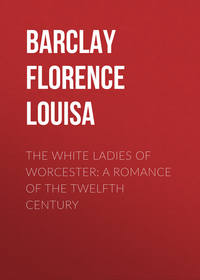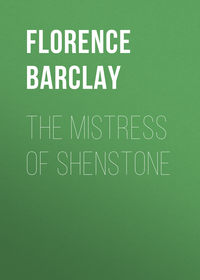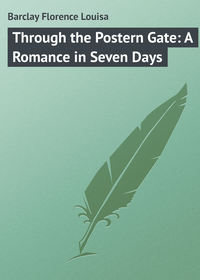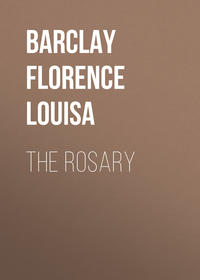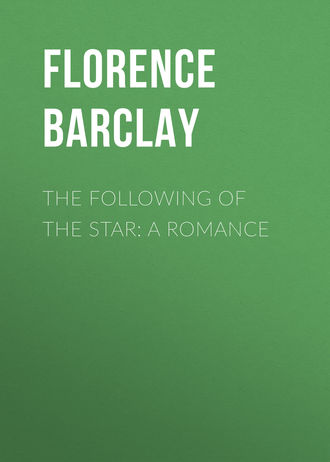 полная версия
полная версияThe Following of the Star: A Romance
No word of the service penetrated her consciousness, until she heard her god-father's voice inquire, in confidential tones: "Who giveth this woman to be married to this man?"
No one replied. Apparently no one took the responsibility of giving her to David, to whom she did not really give herself. But in the silence of the slight pause following the question, Uncle Falcon's voice said, with startling clearness, in her ear: "Diana – I have won."
This inarticulate sentence seemed to Diana the clearest thing in the whole of that service. She often wondered afterwards why all actual spoken words had held so little conscious meaning. She could recall the strong clasp of David's hand, and when his voice, steadfast yet quiet, said: "I will," she looked at him and smiled; simply because his voice seemed the only real and natural thing in the whole service.
When they walked up the chancel together, and knelt at the altar rail, she raised her eyes to the pictured presentment of the crucified Christ; but there was something too painful to be borne, in the agony of that suffering form as pictured there. "Myrrh!" cried her troubled heart; "myrrh, was His final offering. Must gold and frankincense always culminate in myrrh?"
In the vestry, Sir Deryck Brand was the first to offer well-expressed congratulations. But, after the signing of the registers, as he took her hand in his in bidding her farewell, he said with quiet emphasis: "I have told your husband, Mrs. Rivers, that he must come home within the year."
Diana, at a loss what to answer, turned to David.
"Do you hear that, David?"
"Yes," said David, gently; "I hear."
As they passed out together, her hand resting lightly on David's arm, Diana looked up and saw above the organ gallery, between the golden pipes, the beautiful stained-glass window, representing the Infant Christ brought by His mother to the temple, and taken into the arms of the agèd Simeon.
"Oh, look, David," whispered Diana; "I like this window better than the others. It does not give us our Wise Men from the East, but it gives us the new-born King. Do you see Him in the arms of Simeon?"
David lifted his eyes; and suddenly she saw the light of a great joy dawn in them.
"Yes," he said, "yes. And do you remember what Simeon said?"
They had reached the threshold of St. Botolph's. Diana took her hand from his coat sleeve; and, pausing a moment, looked into his face.
"What did he say, David?"
"Lord, now lettest Thou Thy servant depart in peace," replied David, quietly.
"And what have you just remembered, David, which has filled your face with glory?"
"That this afternoon, I start for Central Africa," replied David Rivers, as he put his bride into the motor.
CHAPTER XVIII
DAVID'S NUNC DIMITTIS
The doctor was responsible for Diana's shyness during the drive from St. Botolph's to Waterloo.
He had said: "I have told your husband, Mrs. Rivers." This was unlike Sir Deryck's usual tact. It seemed so impossible that that dream-like service had transformed her from Miss Rivers, into Mrs. Rivers; and it was so very much calling "a spade a spade," to speak of David as "your husband."
The only thing which as yet stood out clearly to Diana in the whole service, was David's resolute "I will"; and the essential part of David's "I will," in his own mind, and therefore of course in hers, appeared to be: "I will go at once to Central Africa; and I will start for that distant spot in four hours' time!"
Diana took herself instantly to task for the pang she had experienced at sight of the sudden flash of intense relief in David's eyes, as he quoted the Nunc Dimittis.
That he should "depart" on the wedding-day, had been an indispensable factor in the making of her plan; and, that he should depart "in peace," untroubled by the fact that he was leaving her, was surely a cause for thanksgiving, rather than for regret.
Diana, who prided herself upon being far removed from all ordinary feminine weaknesses and failings, now rated herself scornfully for the utter unreasonableness of feeling hurt at David's very obvious relief over the prospect of a speedy departure, now he had faithfully fulfilled the letter of the undertaking between them. He had generously done as she had asked, at the cost of much preliminary heart-searching and perplexity; yet she, whose express stipulation had been that he should go, now grudged the ease with which he was going, and would have had him a little sad – a little sorry.
"Oh," cried Diana, giving herself a mental shake, "it is unreasonable; it is odious; it is like an ordinary woman! I don't want the poor boy to stay, so why should I want him to regret going? How perfectly natural that he should be relieved that this complicated time is over; and how glad I ought to be, that whatever else connected with me he has found difficult, at all events he finds it easy to leave me! Any mild regrets would spoil the whole thing, and reduce us to the level of an ordinary couple. Sir Deryck's remark in the vestry was most untactful. No wonder it has had the immediate effect of making us both realise with relief that, excepting in outward seeming, we each leave the church as free as when we entered it."
Yet, undoubtedly David was now her husband; and as Diana sat silently beside him, she felt as an experienced fighter might feel, who had handed over all his weapons to the enemy. What advantage would David take, of this new condition of things, during the four hours which remained to him? She felt defenceless.
Diana plunged both her hands into her muff. If David took one of them, there was no knowing what might happen next. She remembered the compelling power of his eyes, as they drew her up the church, to take her place at his side. How would she feel, what would she do, if he turned and looked so, at her – now?
But David appeared to be quite intent on the sights of London, eagerly looking his last upon each well-known spot.
"I am glad this is a hired motor," he said, "and not your own chauffeur. This fellow does not drive so rapidly. One gets a chance to look out of the window. Ah, here is the Bank of England. I have never felt much interest in that. But I like seeing the Royal Exchange, because of the Prince Consort's text on the marble slab, high up in the centre of its façade."
They were held up for a moment in the stream of cross-traffic.
"My father pointed it out to me when I was a very little chap," continued David. "I really must see it again, for the last time."
He leaned forward to look up through the window on her side of the motor. His arm rested for a moment against Diana's knee.
"Yes, there it is, in golden letters, on the marble slab! 'The earth is the Lord's, and the fulness thereof.' Wasn't it a grand idea? That those words should dominate this wonderful centre of the world's commerce, wealth, and enterprise. As if so great, so mighty, so influential a nation as our own, upon whose glorious flag the sun never sets, is yet humbly proud to look up and inscribe, in letters of gold, upon the very pinnacle of her supremacy: 'The earth is the Lord's!' All this wealth, all this power; these noble colonies, this world-encircling influence, may be mine; but – 'The earth is the Lord's.'"
David's eyes glowed. "I am glad I have seen it once more. It is not so clear as when, holding tightly to my father's hand, I first looked up and saw it, twenty-two years ago. The letters are tarnished. If I were a rich man, I should like to have them regilt."
"You are a rich man," said Diana, smiling, "and it shall be done, David, if private enterprise is allowed the privilege."
"Ah, thanks," said David. "That would really please me. You must write and say whether it proved possible. Sometimes when alone, in the utter silence of our great expanse of jungle and forest, I like to picture the rush and rumble, the perpetual movement of this very heart of our grand old London, going on – on – on, all the time. It is my final farewell to it, to-day. Ah, here is the Mansion House. On the day my old dad showed me the Royal Exchange, we also saw the Lord Mayor's show. I remember I was much impressed. I fully intended then to be Lord Mayor, one day! I always used to imagine myself as being every important personage I admired."
"You remind me," said Diana, "of a very great man of whom it has been said that he never enjoys a wedding, because he cannot be the bride; and that he hates attending funerals, because he cannot be the corpse."
David laughed. "A clever skit on an undoubted trait," he said; "but that trait makes for greatness. All who climb high see themselves at the top of the tree, long before they get there." Then suddenly he remarked: "There won't be any éclat about my funeral. It will be a very simple affair; just a stowing away of the worn-out suit of clothes, under a great giant tree in our silent forests."
"Please don't be nasty," said Diana; and, though the words were abrupt, there was such a note of pain in her voice, that David turned and looked at her. There was also pain in her sweet grey eyes. David put out his hand, impulsively, and laid it on Diana's muff.
"You must not mind the thought," he said. "We know it has to come; and I want you to get used to it, just as I have done. To me it only seems like a future plan for a quite easy journey; only there's a lot to be done first. Oh, I say! The Thames. May I tell the man to go along the Embankment, and over Westminster Bridge? I should like a last sight of the Houses of Parliament, and Big Ben; and, best of all, of Westminster Abbey."
David leaned out of the window, and directed the chauffeur.
Diana slipped her hands out of her muff.
They passed the royal statue of England's great and belovèd Queen. David leaned forward and saluted.
"The memory of the Just is blessèd," he said. "I always like to realise how truly the Royal Psalm applies to our Queen Victoria. 'Thou gavest him a long life; even forever and ever.' She lives on forever in the hearts of her people. This – is true immortality!"
Diana removed her gloves, and looked at the bright new wedding-ring, encircling the third finger of her left hand.
David glanced at it also, and looked away.
"Good-bye, old Metropole!" he said, as they sped past Northumberland Avenue. "We have had some jolly times there. Ah, here is the Abbey! I must set my watch by Big Ben."
"Would you like to stop, and go into the Abbey?" suggested Diana. "We have time."
"No, I think not," said David. "I made my final adieu to English cathedrals at Winchester, last Monday. And I had such a surprise and pleasure there. Nothing the Abbey could provide would equal it."
"What was that?" asked Diana, and her hand stole very near to David's.
David folded his arms across his breast, and turned to her with delight in his eyes.
"Why, the day before you came to town, I went down to Winchester to say good-bye to some very old friends. Before leaving that beautiful city I went into the cathedral, and there I found – what do you think? A side-chapel called the Chapel of the Epiphany, with a stained-glass window representing the Wise Men opening their treasures and offering their gifts to the Infant Saviour."
"Were there three Wise Men?" asked Diana. For some reason, her lips were trembling.
David smiled. "Yes, there were three. Mrs. Churchwarden Smith would have considered her opinion triumphantly vindicated. But, do you know, that little chapel was such a holy place. I knelt there and prayed that I might live to see the completion and consecration of our 'Church of the Holy Star.'"
Diana drew on her gloves, and slipped her hands back into her muff.
"Where did you kneel, David? I will make a pilgrimage to Canterbury, and kneel there too."
"It wasn't Canterbury," said David gently. "It was Winchester. I knelt at the altar rail; right in the middle."
"I will go there," said Diana. "And I will kneel where you knelt, David."
"Do," said David, simply. "That little chapel meant a lot to me."
They had turned out of York Road, and plunged into the dark subway leading up to the main station at Waterloo.
Diana lifted her muff to her lips, and looked at David over it, with starry eyes.
"Shall you remember sometimes, David, when you are so far away, that I am making pilgrimages, and doing these things which you have done?"
"Of course I shall," said David. "Why, here we are; with plenty of time to spare."
He saw Diana to their reserved compartment in the boat train; then went off to the cloak-room to find his luggage.
Before long they were gliding out of Waterloo Station, and David Rivers had looked his last on London; and had bidden a silent farewell to all for which London stands, to the heart of every true-born Englishman.
CHAPTER XIX
DAVID STUDIES THE SCENERY
The railway journey passed with surprising ease and swiftness. David's unusually high spirits were perhaps responsible for this.
To Diana it seemed that their positions were suddenly and unaccountably reversed. David led, and she followed. David set the tone of the conversation; and, as he chose that it should be gay and bantering, Diana found it impossible to strike the personal and pathetic note, bordering on the intimate and romantic, which she, somehow, now felt suitable to the occasion.
So they had a merry wedding-breakfast in the dining-car; and laughed much over the fact that they had left Mrs. Marmaduke Vane, with two strings to her bow – Diana's godfather, and Diana's lawyer.
"Both are old flames of Chappie's," explained Diana. "She will be between two fires. But I am inclined to think Sarah's presence will quench god-papa's ardour. In which case, Mr. Inglestry will carry Chappie off to luncheon, and will probably dance attendance upon her during the remainder of the day. After which, even if he does not actually propose, I shall have to hear the oft-told tale: 'He made his meaning very clear, my dear Diana.' How clever all these old boys must be, to be perpetually 'making their meaning clear' to Chappie, which, I admit, must be a fascinating occupation, and yet remaining triumphantly unwed! Chappie does not return home until to-morrow. David – I shall be quite alone at Riverscourt to-night."
"Oh, look at the undulating line of those distant hills!" cried David, polishing the window with his table-napkin. "And the gorse in bloom, on this glorious common. It seems a waste to look for a moment on one's plate, while passing, for the last time, through beautiful England. Even in winter this scenery is lovely, gentle, home-like. I don't want to miss the sight of one cosy farmhouse, leafless orchard, nestling village, or old church tower. All upon which I am now looking, will be memory's treasured picture-gallery to visit eagerly in the long months to come."
Apparently there were to be only landscapes in David's picture gallery. Portraits, however lovely, were not admitted. A very lovely face was opposite to him at the little table. A firm white chin rested thoughtfully in the rounded palm of the hand on which gleamed his golden wedding-ring. Soft grey eyes, half-veiled by drooping lids and long dark lashes, looked wistfully, earnestly, at the thin lines of his strong eager face. Diana was striving to imprint upon her memory a portrait of David, which should not fade. But David polished the window at intervals with his table-napkin, and assiduously studied Hampshire orchards, and frost-covered fields and gardens.
Back in their own compartment, within an hour of Southampton, Diana made a desperate attempt to arrive at a clear understanding about the rapidly approaching future – those two years, possibly three, while they would be husband and wife, yet on different sides of the globe.
She was sitting beside David, who occupied the corner seat, facing the engine, on her left. Diana had been seated in the corner opposite to him; but had crossed over, in order to sit beside him; and now asked him, on pretext of being dazzled, to draw down the blinds on his side of the compartment.
David complied at once, shutting out the pale wintry sunlight; which, pale though it was, yet made a golden glory of Diana's hair.
Thus excluded from his refuge in the leafless orchards, David launched into a graphic description of the difficulties and adventure of African travel.
"You see," he was saying, "the jungle grasses grow to such a height that it becomes almost impossible to force one's way through them; and they make equally good cover for wild beasts, or mosquitoes" – when Diana laid her hand upon his coat sleeve.
Either the sleeve was thick, or David was dense – or both. The account of African swamps continued, with increased animation.
"As soon as the wet season is over, the natives fire the grass all around their villages; and then wild beasts get no cover for close approach; shooting becomes possible, and the women can get down to the river to fetch water, or into the forests to cut firewood. The burning kills millions of mosquitoes, makes it possible to go out in safety, and to shoot game. When the grass is high, mosquitoes are rampant, and game impossible to view. Before the burning was done round my place, last year, I found a hippopotamus in my flower garden, when I came down to breakfast one morning. He had danced a cake-walk among my oleanders, which was a trial, because oleanders bloom gloriously all the year round when once they get a hold."
Suddenly Diana turned upon him, took his right hand between both hers, and caught it to her, impulsively.
"David," she said, "do you consider it right in our last hour together, completely to ignore the person you have just married?"
David's startled face showed very white against the green window-blind.
"I – I was not ignoring you," he stammered, "I was telling you about – "
"Oh, I know!" cried Diana, uncontrollable pain in her voice, and the look of a wounded leopard in her eyes, "Bother your tall grasses, and your oleanders, and your hippopotamus!" Then more gently, but still holding his hand pressed against her velvet coat: "Oh, don't let's quarrel, David! I don't want to be horrid! But we can't ignore the fact that we were married this morning; and you are wasting the only time left to us, in which to discuss our future."
David gently drew away his hand, folded his arms across his breast, leaned back in his corner, and looked at Diana, with that expression of patient tenderness which always had the effect of making her feel absurdly young, and far removed from him.
"Have we not said all there is to say about it?" he asked, gently.
"No, silly, we have not!" cried Diana, furiously. "Oh, how glad I am that you are going to Central Africa!"
David's face whitened to a terrible pallor.
"There is nothing new in that," he said, speaking very low. "It has been understood all along."
"Oh, David, forgive me," cried Diana. "I did not mean to say anything unkind. But I am so miserable and unhappy; and if you say another word about Hampshire scenery or African travel, I shall either swear and break the windows, or fall upon your shoulder and weep. Either course would involve you in an unpleasant predicament. So, for your own sake, help me, David."
David's earnest eyes searched her face.
"How can I help you?" he asked, his deep voice vibrating with an intensity which assured Diana of having gained at last his full attention. "What has made you miserable?"
"Our wedding-service," replied Diana, with tears in her voice. "It meant so much more than I had ever dreamed it possibly could mean."
Then a look leapt into David's eyes such as Diana had never seen in mortal eyes, before.
"How?" he said; the one word holding so much of question, of amazement, of hope, of suspense, that its utterance seemed to arrest the train; to stop the beating of both their hearts; to stay the universe a breathing space; while he looked, with a world of agonised hope and yearning, into those sweet grey eyes, brimming over with tears.
Perhaps the tears blinded them to the meaning of the look in David's. Anyway, his sudden "How?" bursting as a bomb-shell into the silent railway-carriage, only brought an expression of startled surprise, to add to the trouble in Diana's sweet face.
David pulled himself together.
"How?" he asked again, more gently; while the train, the hearts, and the universe went on once more.
"Oh, I don't know," said Diana, with a little break in her voice. "I think I realised suddenly, how much it might mean between two people who really cared for one another – I mean really loved– for we do 'care'; don't we, Cousin David?"
"Yes, we do care," said David, gently.
"I want you to talk to me about it; because the service was so much more solemn than I had expected; I have never been at any but flippant weddings – what?.. Oh, yes, weddings are often 'flippant,' Cousin David. But ours was not. And I am so afraid, after you are gone, it will come back and haunt me. I want you to tell me, quite plainly, how little it really meant; although it seemed to mean so appallingly much."
David laid his hand gently on hers, as it lay upon her muff, and the restless working of her fingers ceased.
"It meant no more," he said, quietly, "than we intended it should mean. It meant nothing which could cause you distress or trouble. All was quite clear between us, beforehand; was it not? That service meant for you – your home, your fortune, your position in the county, your influence for good; deliverance from undesired suitors; and – I hope – a friend you can trust – though far away – until death takes him – farther."
He kept his hand lightly on hers, and Diana's mind grew restful. She laid her other hand over his. She was so afraid he would take it away.
"Oh, go on David," she said. "I feel better."
"You must not let it haunt you when I am gone," continued David. "You urged me to do this thing, for a given reason; and, when once I felt convinced we were not wrong in doing it, I went through with it, as I had promised you I would. There was nothing in that to frighten or to distress you. We could not help it that the service was so wonderful. That was partly your fault," added David, with a gentle smile, "for providing organ music, and for choosing to impersonate my Lady of Mystery."
Diana considered this. Then: "Oh, I am so comforted, Cousin David," she said. "I was so horribly afraid it had – somehow – meant more than I wanted it to mean."
"How could it have meant more than you wanted it to mean?"
"I don't know. I begin to think Uncle Falcon was right, when he called me ignorant and inexperienced."
David laughed. "Oh, you mustn't begin to give in to Uncle Falcon," he said. "And to-day, of all days, when our campaign has succeeded, and we have defeated him. You can go into the library this evening, look Uncle Falcon full in the eyes, and say: 'Uncle Falcon, I have won!'"
"Can I?" said Diana, doubtfully. "I am a little bit afraid of Uncle Falcon. I could, if you were there, Cousin David."
David tried to withdraw his hand; but the hand lying lightly upon it immediately tightened.
"Are you sure I shan't be haunted after you are gone?" asked Diana, with eyes that searched his face.
"Not by me," smiled David.
"Of course not. But by the service?"
"Are any special words troubling you?" he asked, gently.
"Goodness, no!" cried Diana. "I realised nothing clearly excepting 'I will,' when you said it. I haven't a ghost of a notion what I promised."
"Then if you haven't a ghost – " began David.
"Oh, don't joke about it," implored Diana. "I am really in earnest. I was horribly afraid; and I did not know of what. I began to think I should be obliged to ask you to put off, and to go by a later boat."
"Why?"
"So as to have you here, to tell me it had not meant more than we intended it should mean."
Diana took off her large hat, and threw it on to the seat opposite. Then she rested her head against the cushion, close to David's.
"Oh, this is so restful," she sighed; "and I am so comforted and happy! Do let's stop arguing."
"We are not arguing," said David.
"Oh, then let's stop not arguing!"
She lifted his hand and her muff together, holding them closer to her.


